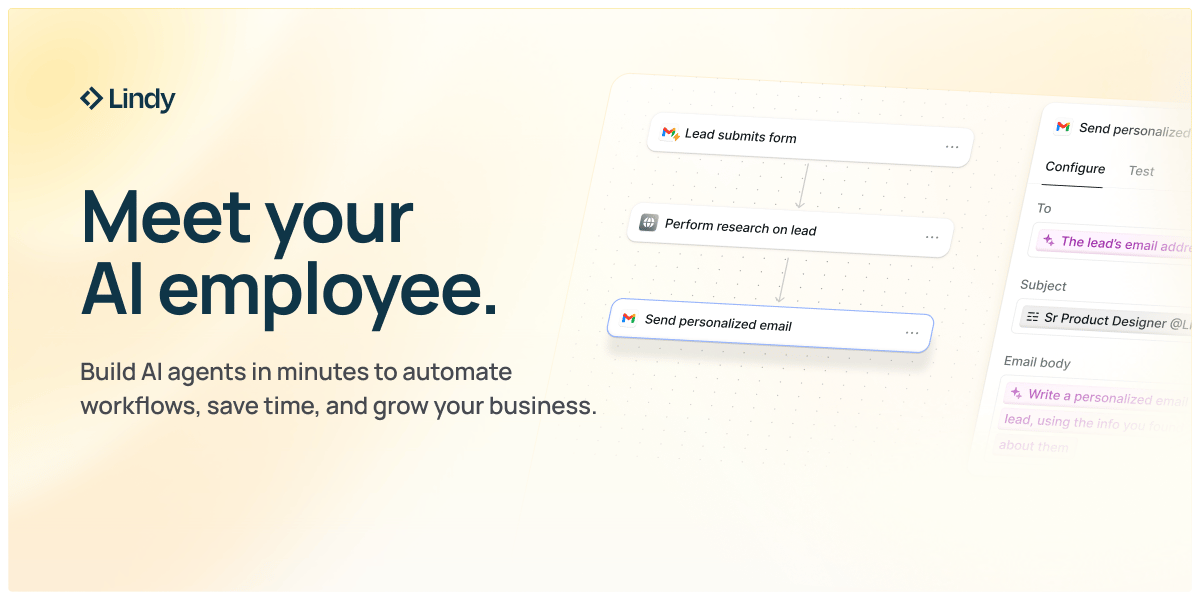- AI Pulse
- Posts
- 🤯 Gemini Just Got a Jaw-Dropping Upgrade
🤯 Gemini Just Got a Jaw-Dropping Upgrade

Hello There!
After the buzz around OpenAI’s Sora launch, both OpenAI and Google are already moving fast. Altman is rethinking copyright with an “opt-in” model, while Google is quietly preparing a flashy Gemini makeover that could shake up the AI app race.
In today’s AI Pulse
⚡ The AI Report – Built for Leaders
🤖 Lindy – Builds AI agents in minutes.
🎬 Sora’s Bold Copyright Pivot – OpenAI moves to opt-in, handing power to rightsholders.
📲 Gemini’s Stunning Redesign – A vibrant feed of prompts makes AI more fun.
AI isn’t slowing down, it’s rewriting the rules of copyright, creativity, and competition at the same time.
Used by Execs at Google and OpenAI
Join 400,000+ professionals who rely on The AI Report to work smarter with AI.
Delivered daily, it breaks down tools, prompts, and real use cases—so you can implement AI without wasting time.
If they’re reading it, why aren’t you?
The Simplest Way to Create and Launch AI Agents and Apps
You know that AI can help you automate your work, but you just don't know how to get started.
With Lindy, you can build AI agents and apps in minutes simply by describing what you want in plain English.
From inbound lead qualification to AI-powered customer support and full-blown apps, Lindy has hundreds of agents that are ready to work for you 24/7/365.
Stop doing repetitive tasks manually. Let Lindy automate workflows, save time, and grow your business.
🧠The Pulse
OpenAI’s new video app Sora is already sparking changes. Just days after launch, CEO Sam Altman announced that Sora will introduce “granular,” opt-in copyright controls. The move marks a shift from the controversial opt-out model OpenAI had pitched to Hollywood, and it comes as the app rockets up the App Store charts. While OpenAI frames this as giving rightsholders more choice, it also raises fresh questions about how AI platforms will navigate copyright, privacy, and monetization.
📌The Download
OpenAI will require explicit opt-in from copyright holders before Sora users can generate videos with studio-owned characters. This replaces the earlier opt-out stance and gives rightsholders more authority to decide how their IP can be used or blocked.
Sora’s viral growth has been fueled by its “cameos” feature, which lets users upload biometric data to insert their digital likeness into AI videos. At the same time, some users have pushed boundaries by making unauthorized videos with characters like Pikachu or SpongeBob, sometimes even parodying OpenAI itself.
To sustain the platform, OpenAI plans to explore monetization beyond charging during high-demand periods. Altman suggested new revenue-sharing models with rightsholders, while acknowledging that some edge cases of misuse are likely to slip through.
💡What This Means for You
For users, this shows how quickly the rules around copyright in AI-generated media are evolving. Fan creativity may find new limits, but also potential collaboration paths with studios. For rightsholders, it signals that AI companies are beginning to offer real bargaining power and even revenue opportunities. And for the wider industry, Sora’s shift to an opt-in model could set a new precedent for how generative AI tools handle intellectual property going forward.
🧠The Pulse
Google may soon give its Gemini AI app a major makeover. After the viral success of OpenAI’s video app Sora, Google is testing a redesigned Gemini experience that swaps the simple chatbot-style interface for a scrollable, visually engaging feed. The revamp isn’t live yet, but code found in the latest Android app suggests Google wants Gemini to feel more creative, more inspiring, and better positioned against ChatGPT.
📌The Download
A reverse engineer uncovered Gemini’s experimental new home screen in the app’s code, showing shortcut buttons for features like “Create Image” and “Deep Research,” followed by a scrolling feed of colorful prompt suggestions.
Suggested prompts shown in tests included playful ideas like “Teleport me to deep space,” “Turn my drawing into a storybook,” and “Give me a vintage or grunge look,” alongside productivity-focused prompts like “Brainstorm out loud with Live” or “Send me a daily news roundup.”
Google hasn’t officially announced the revamp, but if rolled out, it would make Gemini far more visually engaging. It could also tap into demand for its new AI image model, Nano Banana, which helped Gemini briefly reach the No. 1 spot in the App Store last month before being overtaken by Sora.
💡What This Means for You
For users, the redesign could make Gemini easier and more fun to explore, lowering the barrier to discovering what the AI can do. For Google, it’s a way to compete more directly with OpenAI by leaning into visual inspiration and personalization. And for the AI landscape more broadly, this shows how fast competition is pushing apps to evolve beyond plain chatbots into richer, multimedia-driven experiences.
That’s it for today’s AI Pulse!We’d love your feedback, what did you think of today’s issue? Your thoughts help us shape better, sharper updates every week. |
🙌 About Us
AI Pulse is the official newsletter by AIGPE™. Our mission: help professionals master Lean, Six Sigma, Project Management, and now AI, so you can deliver breakthroughs that stick.
Love this edition? Share it with one colleague and multiply the impact.
Have feedback? Hit reply, we read every note.
See you next week,
Team AIGPETM




